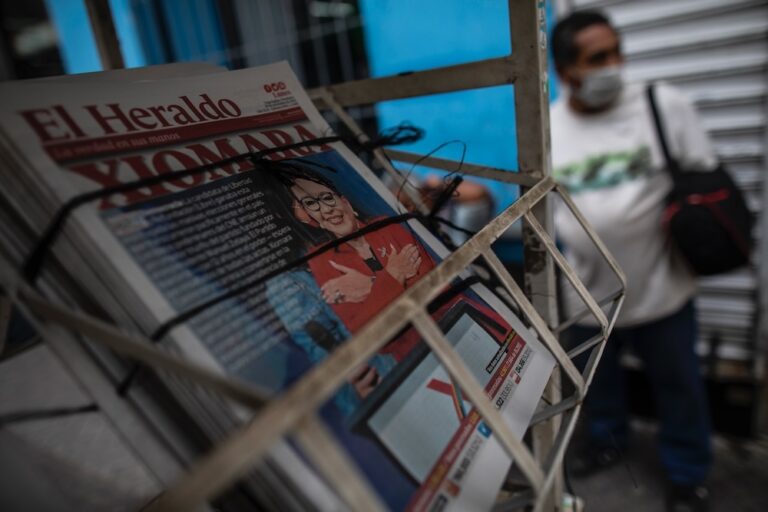(PROBIDAD/IFEX) – Journalists with the Civil Association for a More Just Society (Asociación civil por una Sociedad más Justa, ASJ) have been subject to harassment and a series of acts of intimidation since mid-August 2006. The perpetrators are personnel with the private security company Delta Segurity, who are reacting to recent investigative articles that exposed […]
(PROBIDAD/IFEX) – Journalists with the Civil Association for a More Just Society (Asociación civil por una Sociedad más Justa, ASJ) have been subject to harassment and a series of acts of intimidation since mid-August 2006. The perpetrators are personnel with the private security company Delta Segurity, who are reacting to recent investigative articles that exposed the company’s contravention of labour laws.
Delta Segurity is owned by businessman Elvin Richard Swasey and its main office is based in La Ceiba, on the country’s Atlantic coast. In their investigation, the journalists discovered that, in order to continue obtaining government contracts, the company created a subsidiary called Setech. According to the journalists, Setech staff is comprised of former Delta Segurity staff; they were summarily fired from the one and re-contracted with the other, violating all legal procedures.
The journalists not only discovered that the company had violated labour laws and the rights of its employees, but that there were irregularities in the process by which the company obtained government contracts.
Journalist Dina Meza, who oversees ASJ projects and who has been threatened, told the Committee for Free Expression (Comité por la Libre Expresión, C-Libre) that “we are the target of intimidation and telephone threats by company officials who tell us that they are going to destroy us, that we had better take care, and even that they are going to destroy our organisation.”
In the last two weeks, she said, “vehicles without licence plates have circled the ASJ office and the security company has told us that they are going to investigate the legitimacy of our organisation. At the same time, in certain media outlets, articles have begun to appear that question our labour practices, that call into question the reputation of our management staff and our employees, and that question our sources of income. We are confronted with a full-fledged attack on our reputation.”
Meza, together with journalist Claudia Mendoza, are part of the journalistic team that has been threatened. They allege that, on 8 September, former agents of the criminal investigation squad of the police who are now working for Delta Segurity called ASJ to warn them that they were “being watched” and that all their movements were known.
They also say that, during a public event, one of the directors of ASJ was asked by a highly-placed judicial official to provide him with documentation to prove that the ASJ was a legitimate organisation.
ASJ has worked in Honduras for more than a decade, and its mandate encompasses projects to do with land ownership, forestry, community development, and the defence of labour rights – especially among fast-food workers but, more recently, also among employees of security companies. It also publishes a monthly magazine, “Revistazo.com”, in which journalists publish the results of their investigative work, as well as commentaries and news items.
Meza believes that ASJ, in its projects and its journalism, “has brushed up against structures closely integrated with political and economic power sectors in this country, and this has not only bothered those groups, but it has elicited from them, for three weeks now, a serious campaign of intimidation, threats and public defamation.”
Meza says that the ASJ has submitted a complaint to the National Human Rights Commission because “we realize that behind those who are threatening us there are not only influential political and economic interests, but also former police officials who participated in the repressive apparatus of the state during the 1980s.”
This alert was prepared by PROBIDAD with information provided by C-Libre.


